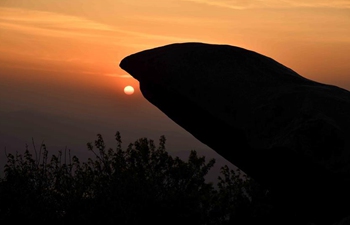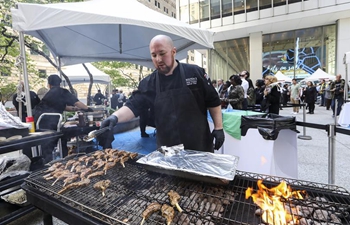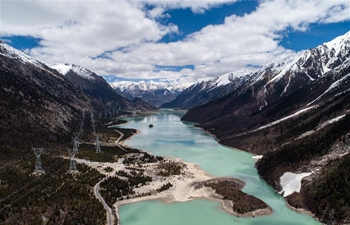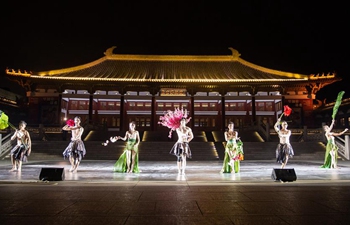by Peter Mertz
DENVER, United States, May 21 (Xinhua) -- The biggest snowfall in 44 years didn't dampen the spirits of pro-choice protesters at a rally Tuesday at the Colorado State Capitol.
A small but vocal crowd of 32 protesters chanted slogans and got hundreds of cars honking horns in approval, as the coat-wearing crowd braved record cold temperatures to demand women's rights in the contentious abortion issue.
They joined thousands of protesters and more than 500 demonstrations staged Tuesday in all 50 states to support abortion rights following recent laws passed in several states to ban most abortions.
"I'm not here for myself -- I'm not worried about getting pregnant," said Way Chen, 75, a retired Denver social worker.
Chen, born in Kunming, China's Yunnan Province in 1944, told Xinhua that she was protesting because of a rash of legislation hitting state houses across the country meant to restrict a woman's right to an abortion.
"MY BODY, MY CHOICE"
"Barbaric, just barbaric," said Chen, whose parents were born near Shanghai.
Chen was referring to the strictest abortion law in the America, which has been passed last week in Alabama and makes abortion illegal in virtually all cases, including rape and incest, and across the south, similar draconian measures are on the table.
"If a child in Alabama is the victim of rape or incest and is forced to have a child ... that's barbaric," she told Xinhua.
On May 7, Georgia joined Mississippi and Ohio to enact a so-called "heartbeat law," meaning virtually all abortions are illegal once a heartbeat is detected, and more states, including Missouri and Louisiana, may follow suit.
The new Alabama law, that has been assailed by liberals and feminists in the American social media, says doctors who perform an abortion could face up to 99 years in prison, a similar term for rapists and murderers.
Abortion rights activists say these kinds of restrictive laws are an attack on Roe v. Wade, the landmark 1973 Supreme Court decision that legalized abortion in America.
"Several states have been passing abortion bans and I'm concerned it will lead to Roe v. Wade being overturned," said Janara Nerone, an environmental educator.
Nerone was standing outside Colorado's gold-domed 1894 state capitol building wearing a green coat, as morning temperatures slowly climbed above freezing.
She was holding a large sign that said "My Body, my Choice."
"The issue comes down to the simple fact that women are human beings, and we deserve to have bodily autonomy," she told Xinhua.
In the United States, typically, conservatives, Republicans and religious groups dominate the anti-abortion voice, while liberals, Democrats and especially feminists champion a woman's choice to choose her form of birth control and the pro-choice movement.
"We are concerned that these cases, once they are challenged legally, will end up in the Supreme Court of the United States, which is now very conservative and Republican," Chen said.
Thanks to Republican U.S. President Donald Trump's Supreme Court nominees -- Neil Gorsuch and Brett Kavanaugh -- the highest court in the United States now has an anti-abortion majority.
MORE COLORADO FLURRIES
Also on Tuesday, Colorado joined 19 states and the District of Columbia in a lawsuit filed in Manhattan to stop a new rule that allows health care clinics to deny abortions and other services to patients based on moral or religious beliefs.
"A patient's access to quality, affordable healthcare should not be driven by the personal beliefs or the discriminatory practices of one individual or organization," Colorado Attorney General Phil Weiser, a Democrat from Boulder, said in a statement Tuesday afternoon.
"Colorado providers should not be forced to choose between giving effective and efficient patient care or risking the loss of more than 6 billion U.S. dollars in federal funds that they rely on to provide that care."
The lawsuit was filed to block the Department of Health and Human Services (HHS) rule, which is scheduled to take effect in 40 days.
Hospitals, universities, clinics and other entities that receive federal funding would have to comply with 25 new HSS laws that protect conscience and religious rights, including abortion, sterilization and assisted suicide.
"This refusal of care rule threatens to cause incredible mischief. It is wrong, unnecessary, and threatens to do real harm," Weiser said.













